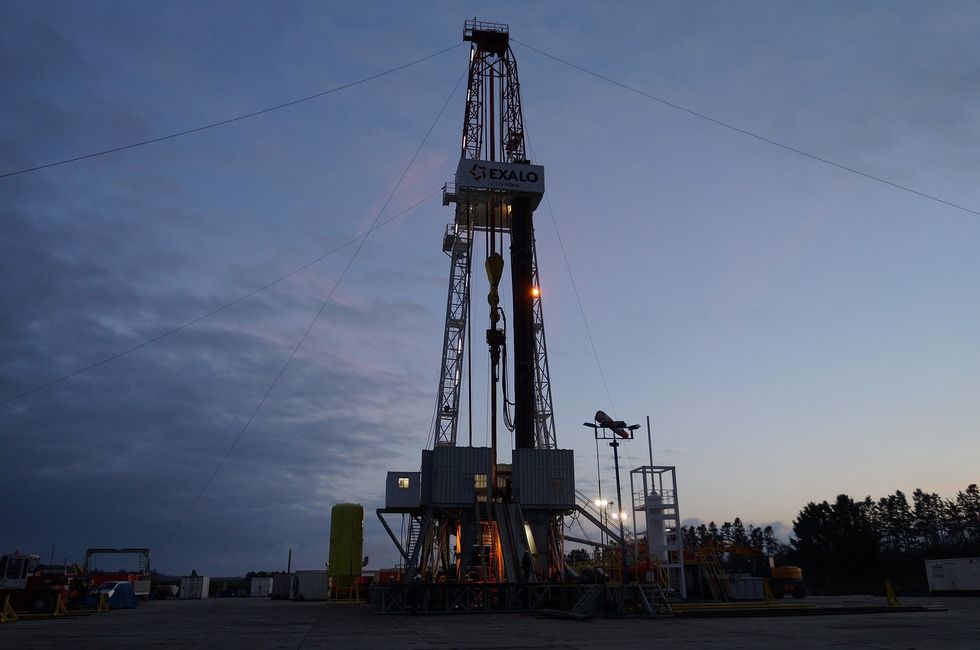fracking chemicals
Pennsylvania Senate Democrats push for greater accountability from natural gas industry
New Mexico families in oil and gas 'waste zone' seek help
Report: "trade secret" chemicals injected nearly 11,000 times at oil and gas wells in Ohio
Fracking linked to increased hospitalizations for skin, genital and urinary issues in Pennsylvania
Rashes, urinary tract infections, and kidney stones requiring hospital stays are more common in areas with more drilling, according to a new study
Fracking may put Pennsylvania communities at greater risk for skin, genital, and urinary diseases, according to new research.
The study, which will be published in the March issue of the journal Public Health, looked at hospital records in Pennsylvania's 67 counties from 2003-2014.
Researchers found that the more fracking wells were in a county, the more hospitalizations the county saw for genital and urinary problems like urinary tract infections, kidney infections, and kidney stones. Fracking, another name for hydraulic fracturing, is a process of extracting oil and gas from the Earth by drilling deep wells and injecting liquid at high pressure.
"It's important point to keep in mind that hospitalizations are for acute illness or serious exacerbations of chronic illness," Alina Denham, a PhD Candidate in Health Services Research and Policy at the University of Rochester and lead author of the study, told EHN. "So if we see strong associations with hospitalizations, it's likely that additional cases of mild symptoms for the same illnesses have been addressed at home or in an outpatient setting, or not addressed at all."

The researchers observed a similar link between fracking wells and hospitalizations for skin issues like rashes caused by cellulitis and abscesses. But while the link between fracking and genital and urinary issues was clear, the many illnesses that could fall under the category of skin-related issues in hospital diagnosis codes (everything from acne and eczema to diaper rash and ulcers) make the study's findings about skin-related issues less definitive.
However, "we do know from formal complaints to the Pennsylvania Department of Health related to fracking activities that these symptoms exist," Denham, said, noting that about 200 individuals filed formal complaints documenting health impacts they thought could be related to fracking from 2011 to 2014, and 40 percent of those included skin problems.
The researchers compared yearly hospitalization rates for each county with the number of new fracking wells drilled, the total number of wells, and the density of wells by land area for each county by year. Pennsylvania accounted for 19 percent of total U.S. marketed natural gas production and produced more natural gas than any other state except Texas in 2017. A majority of the natural gas produced in the state comes from the Marcellus Shale in the southwestern part of the state.
After correcting for demographic factors like race and income, Denham and her colleagues found that as the number of new wells and the well density in a county increased over time, there was a corresponding increase in hospitalization rates for kidney infections, kidney stones, and urinary tract infections, particularly in women ages 20-64.
"[Genital and urinary] diseases are "not something that comes to mind first when we think of the potential impacts of fracking," Denham said. "We were thinking we'd see respiratory or cardiovascular issues, so our findings were surprising."
The researchers were also surprised to learn that these issues mostly affected adult women, rather than children and the elderly, who are generally more vulnerable to environmental health impacts. In general, women are more susceptible to urinary tract infections than men, which can lead to kidney infections and kidney stones if left untreated.

Denham added that a number of other studies, including some that looked at outpatient data rather than hospitalization data, have found links between cardiovascular and respiratory issues like asthma and the air pollution caused by fracking.
Living within a few miles of wells likely makes people more vulnerable to the effects of air pollution, and the study notes that aggregating data at the county-level rather than zipcode likely makes those effects difficult to observe.
While the study didn't investigate why this link between hospitalization rates for skin, genital, and urinary illnesses and fracking exists, the researchers have a few theories.
"There's a growing body of literature on associations between drilling activity and risky sexual behaviors, so it's possible that the increase in genitourinary hospitalizations could be related to that rather than directly linked to drilling activity," Elaine Hill, assistant professor in the Department of Public Health Sciences at the University of Rochester and co-author of the study, told EHN.
They've also hypothesized that the disruption to bacteria deep in the Earth that's caused by fracking, or chemical exposures in drinking water could play a role, Hill said, but they haven't found any strong toxicology or clinical literature to back that up. "In terms of skin-related issues," she added, "there's toxicology literature that suggests close to 50 percent of chemicals used in drilling could have a dermatological effect."
More research is needed, Hill said, "but in the meantime, it's important for people who live in these communities to make themselves aware and make their physicians aware that they live near drilling operations so the healthcare system can respond if there is widespread risk."










